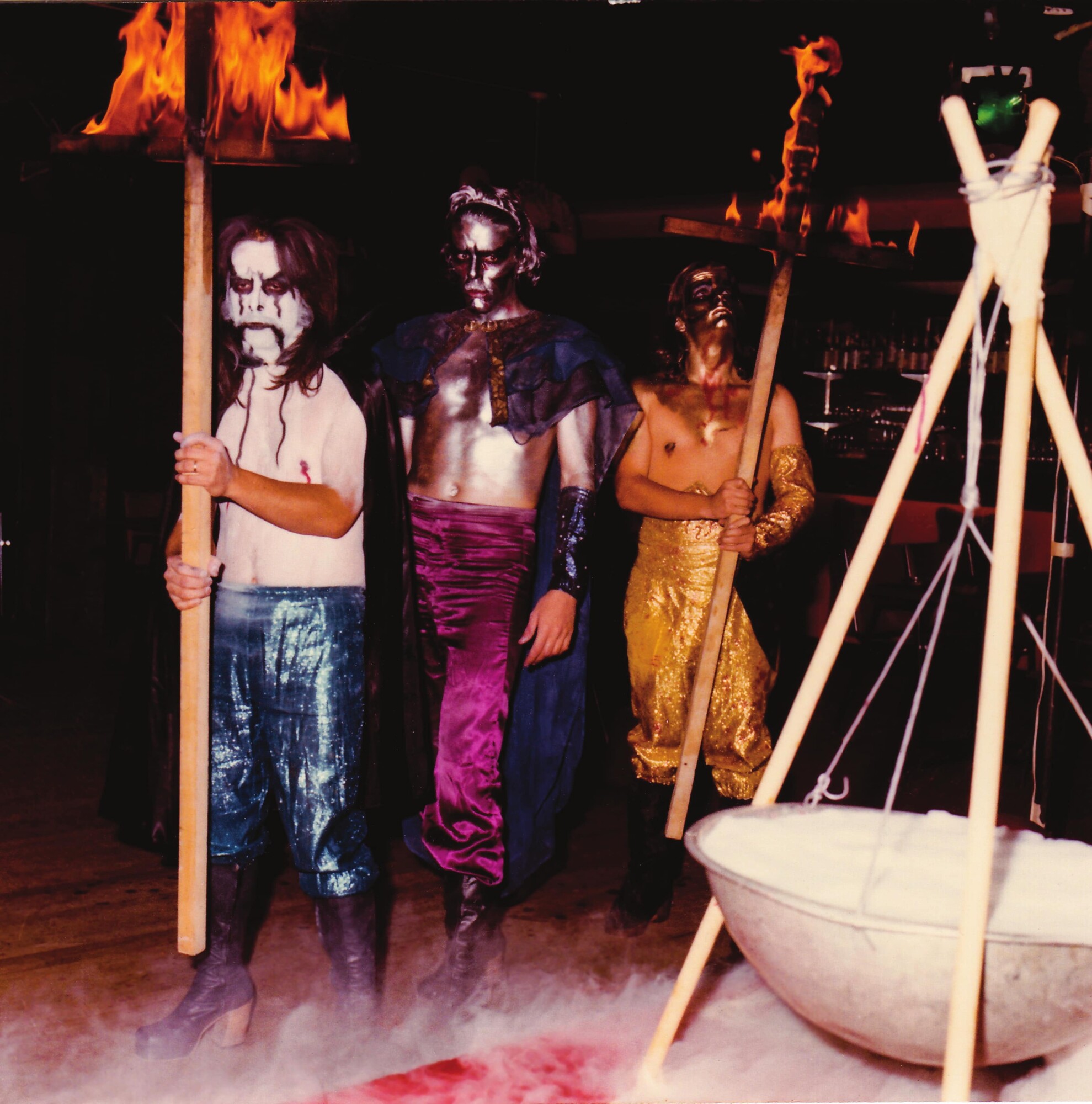Twitch | Interview | “Corpse-paint wearing hard rock band from the 70s”
These crazy corpse-paint-wearing Canadians played the dirtiest kind of proto-punk/doom and could chronologically challenge KISS with their theatrical performances. Essential wasteoid!
Twitch was the brainchild of Ian Steeksma, a talented musician whose family moved to the Vancouver-area town of Burnaby, British Columbia from Ontario in the early 1960s.
In late 1971, Ian Steeksma formed Twitch with Dan Reiland (bass) and Bernie Mulatz (drums). Dan and Ian co-wrote the group’s earliest originals, playing local coffee houses with Rick Laing joining as backup singer/tambourine player shortly after. By winter 1972, Rick had replaced Dan on bass and the trio became a house band at the Golden Ears Lounge in Port Coquitlam, British Columbia, playing three sets nightly.
Despite the backdrop of a bustling local scene, Ian didn’t identify with local bands and resented psych – opting to create a hard rock trio unlike any other. A newspaper article dated January 18, 1973, mentions “the ear-splitting Twitch” playing regularly to capacity audiences, Bartender Dave Le Roux saw the group’s potential and began managing them.
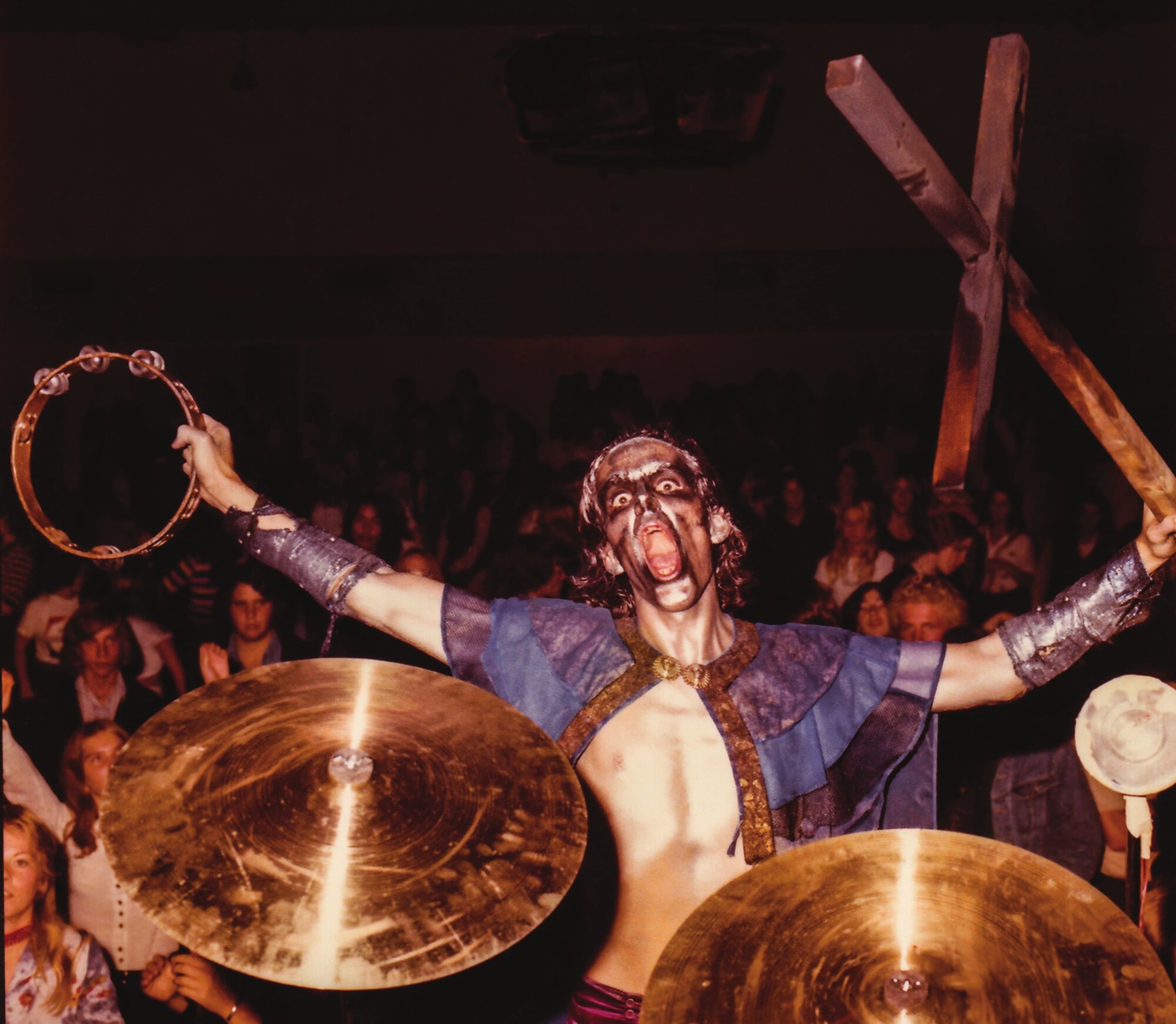
“You can imagine being up close and personal to a ghoulish entity”
Where and when did you grow up? Was music a big part of your family life? Did the local music scene influence you or inspire you to play music?
Ian Steeksma: I came over from England with my parents in 1949. We landed in Montreal and moved from there very quickly to various small towns in Ontario. We ended up in a small rural community called Lucknow. It was basically a farming community very rural. My mother could play piano very well, although once we moved, she didn’t have a place to put one and I think she may have suffered a bit from that, however she saw that I was interested in music and decided to get me accordion lessons.
The accordion I found was fairly simple to play but instead of reading the musical notes on paper I would memorize the song when it was played by the teacher, and she caught me one time playing the piece she had instructed us to learn without moving my eyes over the page of notes. That was the end of my accordion lessons. We didn’t have very much money, but mom really wanted me to learn an instrument, so she bought me a very inexpensive 4 string ukulele. In that era and time there were a lot of TV shows that were very simple and had great easy theme songs. So, I started learning some of them and sang them as well. When the neighbors found out that I could do this they started holding kitchen parties and inviting me over to sing and play songs, which I loved doing.
In my bedroom I had strung up an antenna around the ceiling hooked up to a put together radio. The only station I could get was a rock station in Akron, Ohio believe it or not. So I started learning some of the rock songs of that era, things like ‘Hound Dog’ by Elvis Presley, ‘Patches’ by Dickey Lee, a couple of Ritchie Valens songs as well as my tried and true television theme songs, such as the theme song from Have Gun Will Travel, The Rebel et cetera. Eventually my parents got me a very very cheap acoustic guitar and I started learning 6 strings but by that time we had decided to move from Ontario to British Columbia. My father was a marine engineer and so was away a lot of the time when we lived in Ontario, 8 to 10 months at a time working on ships on the Great Lakes, so I suppose it was my mother’s musical influence that really got me started. Although I must say my father had an amazing voice, rich and strong and I tried to encourage him to sing more around the house, but he wouldn’t. I think he passed that trait on to me because I do not like singing on my own around the house or in the car even with my wife, I just really need a microphone in front of me haha.
Your first group was called The Accents, formed in 1964 when you were 14. The band featured McPherson Park High schoolmates Jim Probyn and Steve Perry among others. What kind of material did you play?
As we were novices at putting the band together and playing, we just had acoustic guitars and that guy named Brian Campbell who played drums for us. We had our first show at an assembly at school and became quite popular, but as I recall that was the one and only show that we did. We fooled around with more music playing The Beatles, The Rolling Stones, The Hollies et cetera. The band really didn’t materialize at that point to the degree that it did when I returned from Nanaimo back to Burnaby after high school.
Your family had relocated to Nanaimo on Vancouver Island, where you formed The Invaders. Where did you get records by The Sonics Paul Revere & the Raiders that clearly influenced your sound? Also tell us a bit more about the group.
After we relocated to Nanaimo during grade 9 at Woodlands Junior Secondary School, I met a guy named Ray Windecker (RIP). Once he knew that I was an aspiring musician, he had learned to play drums in the high school band and was excited about the possibility of forming a band. He knew another fellow called Larry Kulai who could play guitar and sing, and also a wonderful guy called Nick Morris (RIP). Nick could play lap steel guitar and enjoyed it, but we talked him into learning bass and coached him through simple songs that we were learning at the time. Most of the songs that we learned we picked up from listening to the radio and learning them. We also would pool our money and buy 45s and play them over and over again during practice to learn them properly.
The very first time I heard The Sonics, I said to the guys we have to learn this song. We also started learning a bit more edgy tunes including ‘Gloria’ by Them to round out our repertoire.
How The Invaders really got off the ground was at an afternoon sock hop at Nanaimo district secondary school, where we opened with ‘The Witch’ by The Sonics. People were so shocked that they instantly started gathering around and dancing and moving around and that’s how the band really started to take off. We would hold our own dances up and down Vancouver Island and charge admission at the door and it was really well organized. We had security, ticket takers et cetera.
We entered a battle of the bands in Armstrong, British Columbia and placed third. That was an exciting time. It was also the first time that we had written a song and performed it called ‘I Don’t Care’. I can still remember the riff and part of the chorus, but I cannot remember the rest of the song.
You actually recorded a one-song for local radio station CHUB, and the band members received acetate, is that true? Will we ever hear this song?
Yes… Our “manager” got in touch with the local DJ Gene McCormick and he got us into the radio station studio to record the song. It was quite popular with our following at that time, although quite an unsophisticated song. As far as an acetate is concerned I don’t know if anyone has one but I could reach out at some point to Larry who has a really good collection of The Invaders and Cry for Justice memorabilia.
What led to the formation of Cry for Justice?
We were starting to progress and mature in the songs that we were trying to do and decided that we needed a keyboard player. We found a guy named Terry Morrison who was a really good keyboard player and had a Farfisa keyboard which was great, and pretty avant guard at the time.
As we went along we all tried to increase the quality of our equipment. Just about this time both Ray our drummer and Nick our bass player decided to leave the group. I don’t really recall the circumstances. We tried a couple of different drummers and finally ended up with Johnny Wilkinson who still lives in Nanaimo. We found a really good bass player in Dale Irving who could also play guitar which I believe he would have preferred to do but we didn’t need another guitarist at the time, so he took over the bass. He was also a pretty good singer and loved to put on a show as did the rest of us.
We would bring him up to the front of the stage and someone, I don’t recall who, would take over the bass for him and he would become a front man for one song singing ‘Frustration’ by The Painted Ship. At one point he would drop to the floor and writhe around singing all the while. It went over incredibly well. That along with our Paul Revere & the Raiders choreography cemented us as a staple on the island music scene. We were very popular and because we put on our own dances people would come out in droves and at that point in time, I made more money in one weekend than my dad would make in two weeks… So good times!
Later on in life, we would play high school reunions, car club reunions etc with all of the original members of both The Invaders and the Cry for Justice. It was a really great experience and all of those dances were packed to standing room only.
Did you record any of the songs? What kind of tracks did you play? Did you perform any gigs?
We never did record any songs with Cry for Justice and all our music was rock with a really good element of showmanship in it as well, including a couple of psychedelic songs and standards like ‘Mustang Sally’ and ‘Little Latin Lupe Lu,’ and yes as mentioned above we performed lots of shows.
What was the first song you ever composed?
If I recall correctly I believe it was the song ‘I Don’t Care’ in The Invaders.
Can you elaborate the formation of Twitch?
The original power pop trio was formed from a mishmash of members to end up with the three of us finally.
Before the power pop trio we started playing just a couple of local coffeehouses in Vancouver doing songs by Crosby, Stills & Nash and others along the same vein, and at that time it was myself Steve Perry and a girl named Joanne who could sing really well. However, that didn’t go anywhere and shortly after that I met Rick Laing because a couple of his friends would come to our rehearsals and they liked the band, And finally Rick came one night too, I believe, to a coffee house show, and we asked if he wanted to join as a bass player. Rick’s preferred instrument was a guitar but he kindly agreed to play the bass and was really good at it. We needed a drummer and I do not recall how we ended up with Bernie Mulatz, but he was a really good meat and potatoes drummer, and a great person.
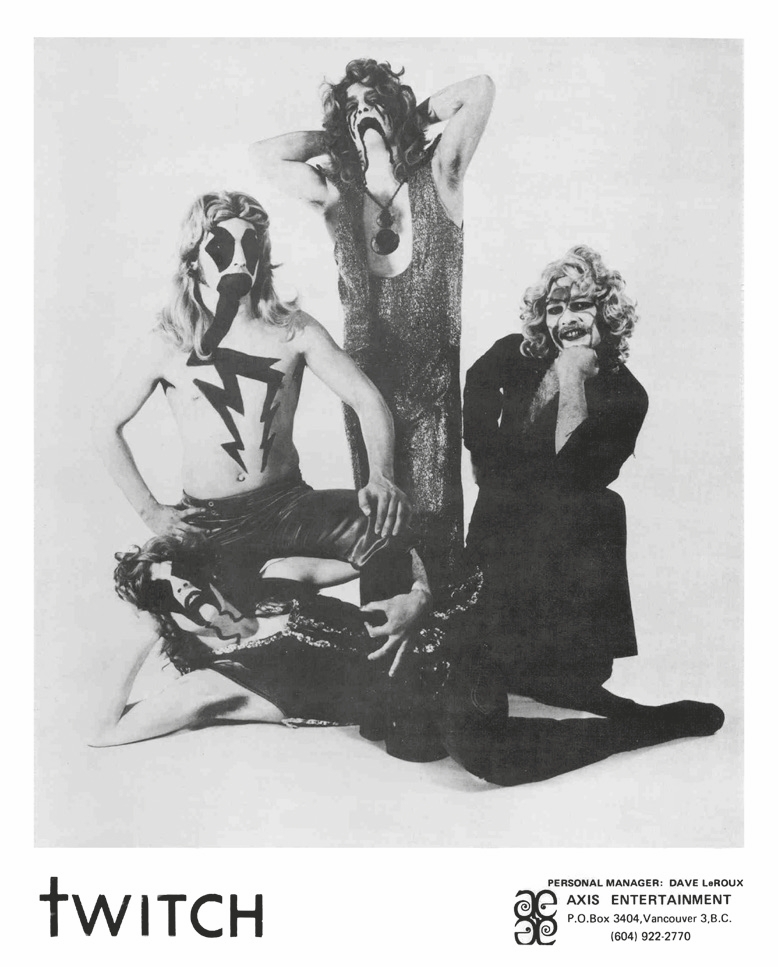
What sort of venues did Twitch play?
We began by playing small bars and creating a following, usually fairly local, and not into Vancouver at this point. We also put on our own dance once, but we weren’t known enough so it was a bust.
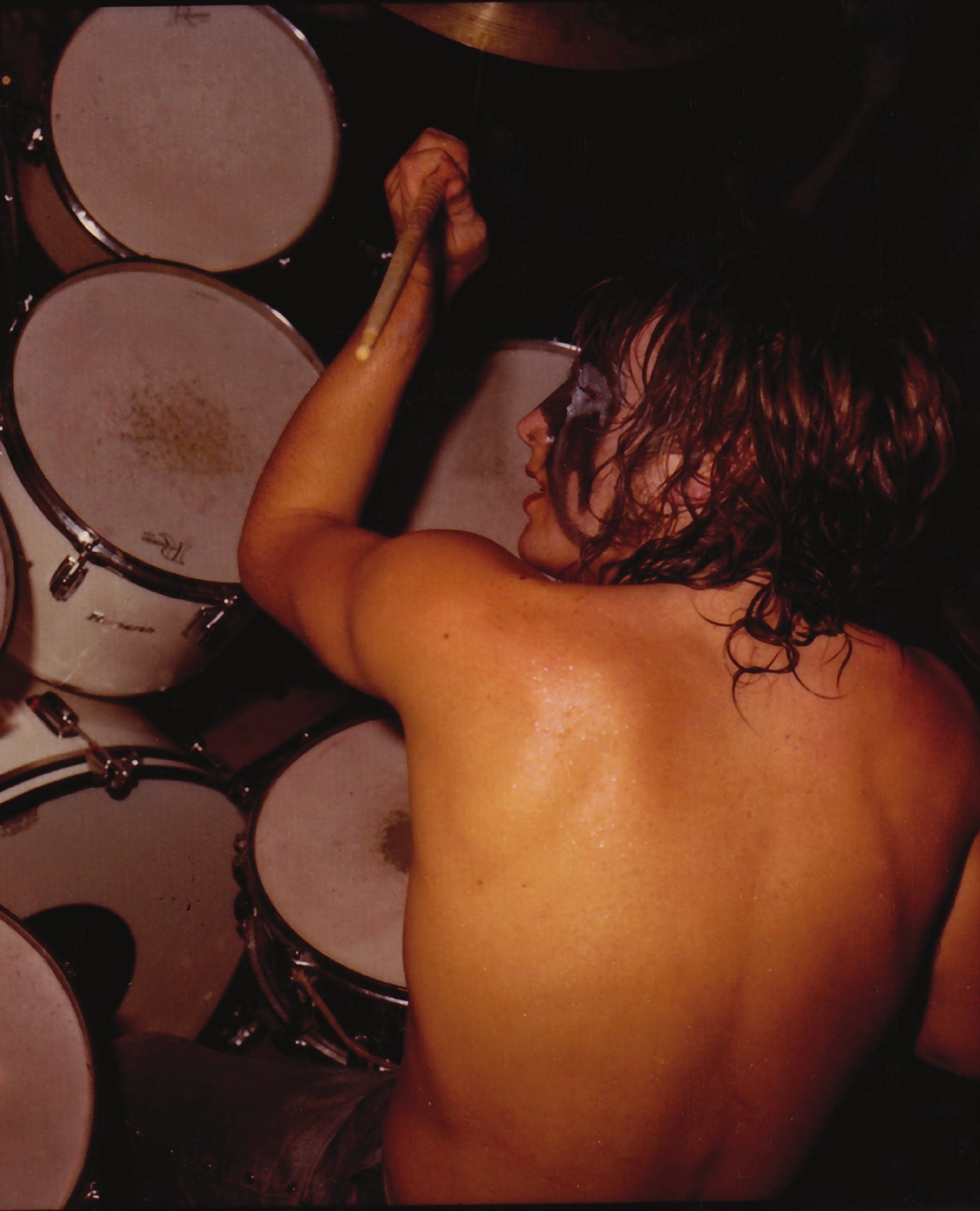
How did you decide to use the name “Twitch”?
As far as the name Twitch came about I believe it was just casual conversation between us talking about people moving around and getting moved by the music, and I think we ended up settling on the name because it was an edgy thing related to spastic movements.
What influenced the band’s sound?
I can’t recall any one thing or number of things that influenced our sound except we wanted to create a very hard rock sound to create an atmosphere where people could really move on the dance floor. At points when we were playing local bars people would want to dance so much that they would actually get up and move tables and dance on the carpet. We broke several bar sales records, people were thirsty as you can imagine.
What was the concept behind a hard rock trio unlike any other?
I think mostly I had seen The Who and was so impressed with what they could do with three instruments and a rock singer, that that sparked my interest in creating not only a hard rock sound but also of volume that would hit people hard. As I recall we mic’d our kick drum so the thump would hit people on the dance floor in the stomach. We also wanted to add an element of showmanship to our gigs so we created the face paint.
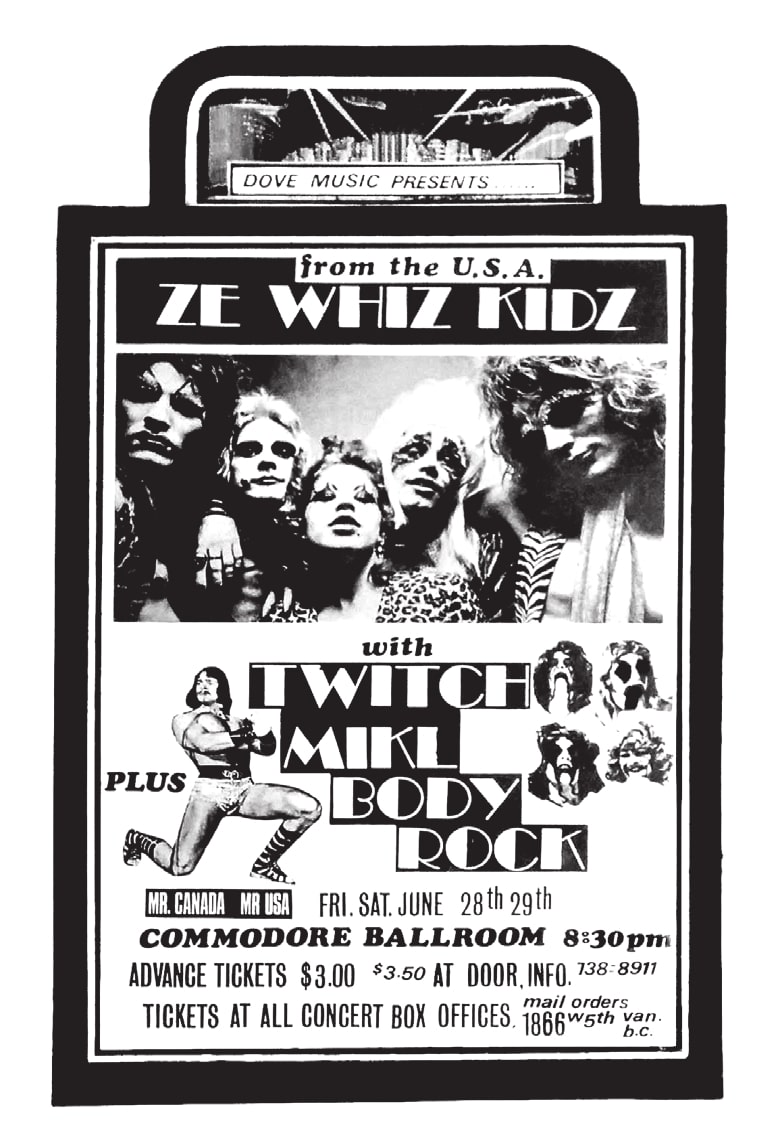
You did two sessions at Can-Base Studios, recording all their original compositions. In May 1973, you pressed roughly 100 copies of a two-song 45 at the local IRC plant for jukebox consumption and promotion; the label states “DEMO” in large letters. Tell us about it.
Wow, that was such a great time and it was the first time that any of us had seen the inside of a professional recording studio. Can-Base later became Mushroom studios, where really up and coming artists like Heart recorded. Our engineer for those sessions was Keith Stein who is very well respected and recorded several very large groups. The recordings were financed by our friend and manager at the time Dave Leroux, who was the bar manager at our home base club we played in as the power pop trio. He put records in the local jukebox in a few places around town and then had a few for sale and they all sold and they were played an awful lot which was pretty exciting for us.
The reason the Demo was printed on the label of the record is because that’s exactly what it was, we had hoped to market it as a demo in hopes that we would pick up a recording contract.
I would love it if you can share some recollection behind the three singles you released; ‘Things’ / ‘Pick-Up Is Illegal on 401,’ ‘Sweet Thursday’ / ‘Country Tune’ and ‘Mess’n With the Bull (Gets the Horn)’ / ‘Spunk’.
‘Things’ and ‘Pick-Up Is Illegal on 401’ (‘DEMO’) were done at the first session in Can-Base studios.
‘Sweet Thursday’ and ‘Country Tune’ were done at the second session on Bird Record Label.
‘Mess’n With the Bull (Gets the Horn)’ and ‘Spunk’ were much later near the beginning of the “Dark Years” era.
I wrote ‘Pick-Up Is Illegal on 401 (Hitchhikers Blues),’ and collaborated lyrically with Dan Reiland on ‘Things,’ ‘Sweet Thursday,’ and ‘Country Tune’. Dan was a part of the “mishmash” members as mentioned earlier, as an acoustic guitar player.
‘Mess’n With the Bull (Gets the Horn)’ was the song that our manager at the time Harvey Borley wrote the lyrics for and asked us to set it to music. At the time he was a concert promoter who had been stiffed (his words) by Nazareth who did not show up as the headline act for a show at the Gardens in Vancouver that he had promoted. He proceeded to confiscate their equipment which led to a lot of other details I don’t recall. They in turn wrote a song called ‘Vancouver Shakedown’ and recorded it, so ‘Mess’n With the Bull (Gets the Horn)’ was Harvey’s answer to that record.
‘Spunk’ was written and sung by my brother Colin, with the rest of the band contributing to the music writing. We were upset when it came out, because the label on the record was titled ‘Mr Spunk,’ when it was supposed to be just ‘Spunk’.
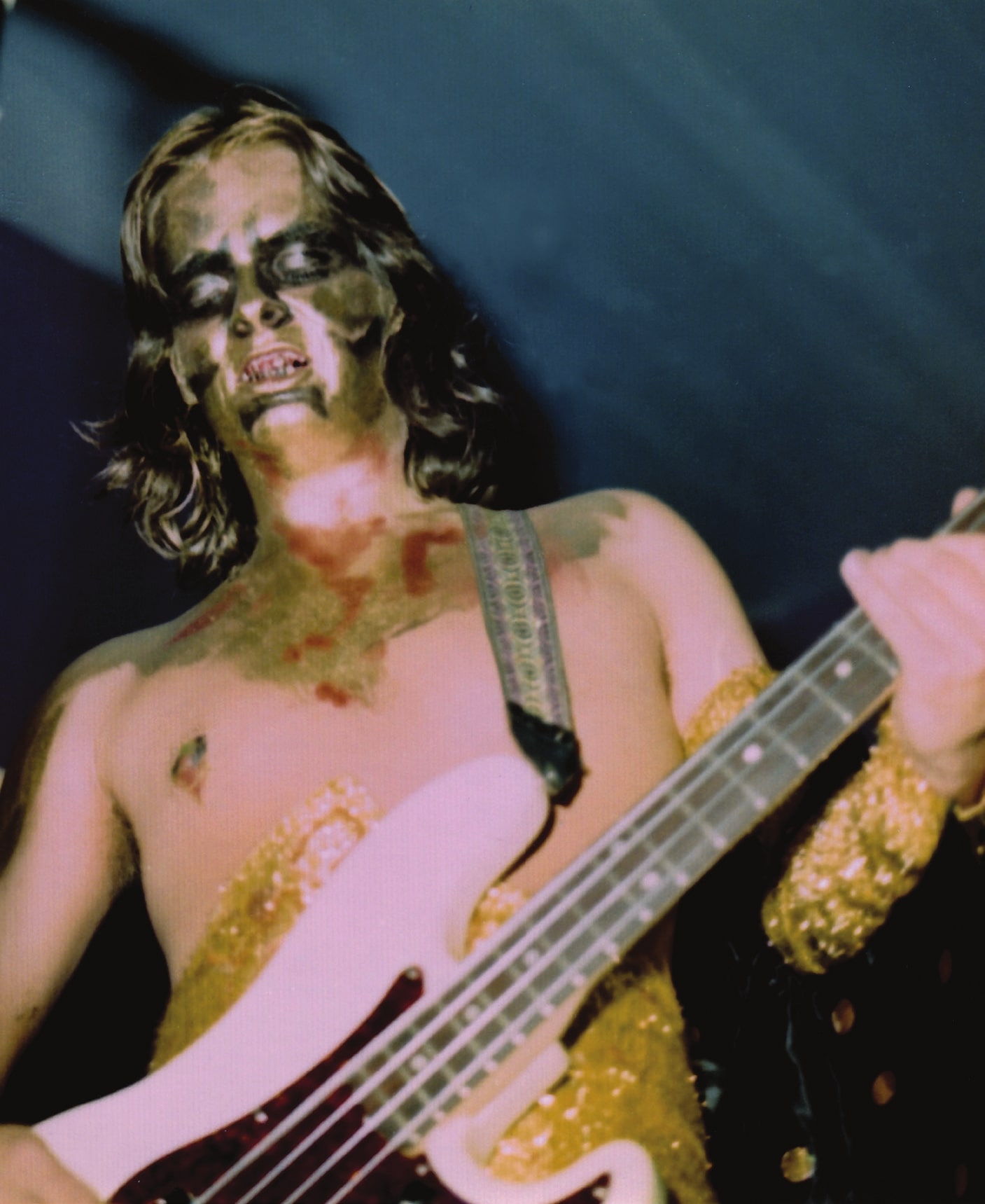
When did you get the idea to wear makeup and use all the effects… I’m curious what that looked like at the gigs?
I have never liked the idea of just standing on stage and playing instruments without giving people something to watch as well so we decided to invest in shocking make up and strange costumes along with adding some effects to our show. This developed later into “The Dark Years” era stage show and “Rock Opera” theatrics.
You can get a good sense of what it looked like from Jason Flowers’ epic album covers and booklets with great photos included in the vinyl album.
So you literally were at the same time as Kiss started doing this?
Slightly before, actually.
“Boiling cauldrons, burning crosses, torture rack, all creating dance floor chaos!”
By the end of June 1974 you were hitting the stage bearing burning crosses and concluding with a staged gunshot-murder with blood gushing as they carried their drummer’s “dead” body off the stage.
We would play our first three sets with really, really fast hard rock songs to get the crowd going and then on our final set we would stage our rock opera theatrics with all original music, which literally blew people’s minds. You can imagine being up close and personal to a ghoulish entity or actually three ghoulish entities at the front of the stage singing songs about witchcraft and occult stuff with a good storyline in the songs, all set to fast paced rock played very loud. Boiling cauldrons, burning crosses, torture rack, all creating dance floor chaos!
It culminated in Mike (our drummer) being shot from the torture rack, tumbling / diving over the drum kit, and landing on center stage spewing (fake) blood all over and then being lifted and carried over my shoulder off the stage, ending the night!
Strange occurrences started happening during our shows later, so we decided not to invite anything evil in any more…so we changed the direction of the show which became the “Good Time Punks” Twitch.
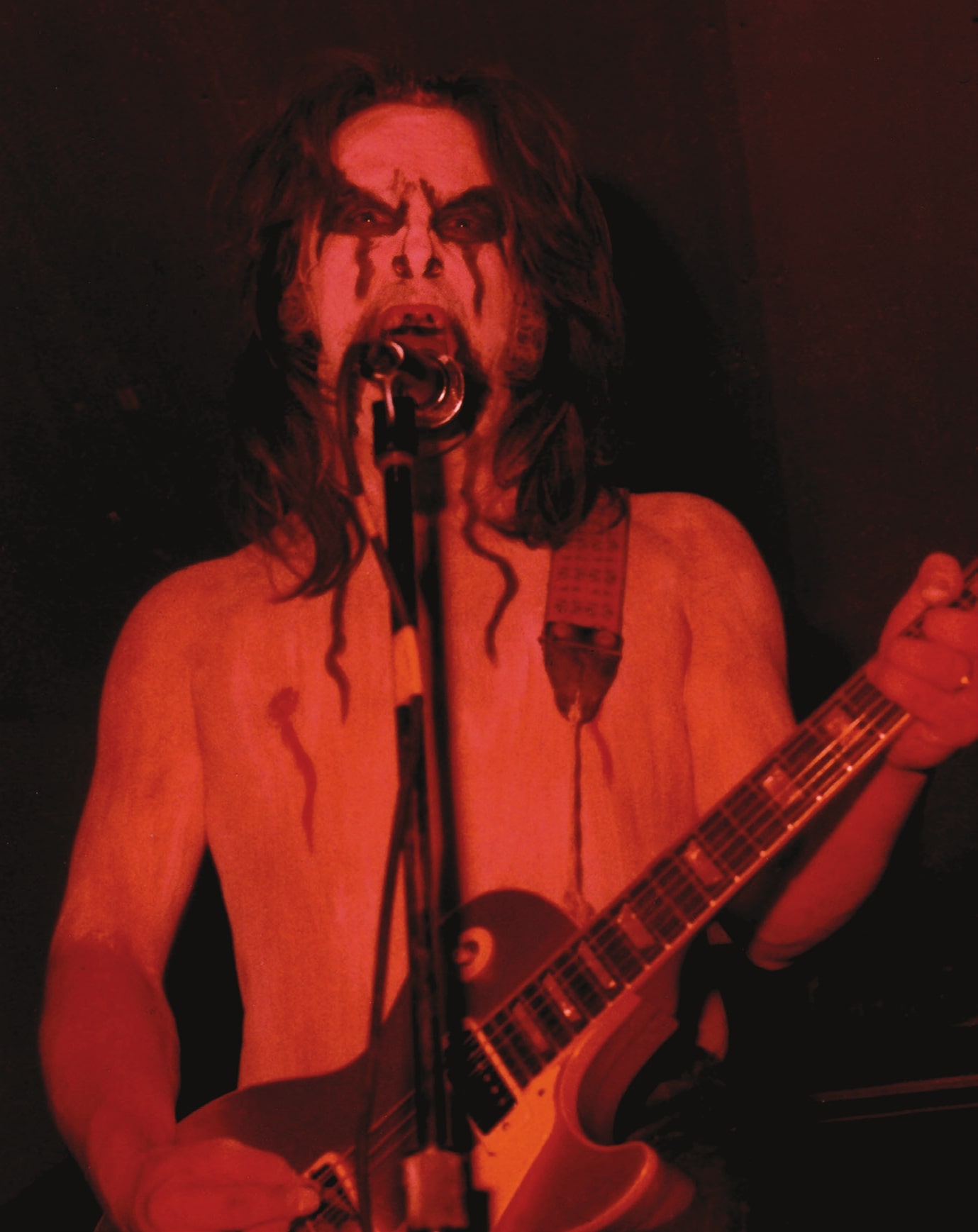
Were you inspired by psychoactive substances like LSD at the time?
Never!
We had to concentrate on doing 50 songs at a fast pace, so we made a pact, never to even drink before or during our sets. We didn’t think it was professional. This attitude and idea carried on into the “Good Time Punks” in the alley era.
Are you happy about the recent Supreme Echo release of ‘Dark Years’? Would you like to share some further words about the material?
Oh wow! Jason did an amazing job on the albums, the legacy, the booklets, the photos et cetera.
It is strange to see our revival 40+ years later, and the impact we had and are having now on a whole new generation of fans. We are humbled and grateful.
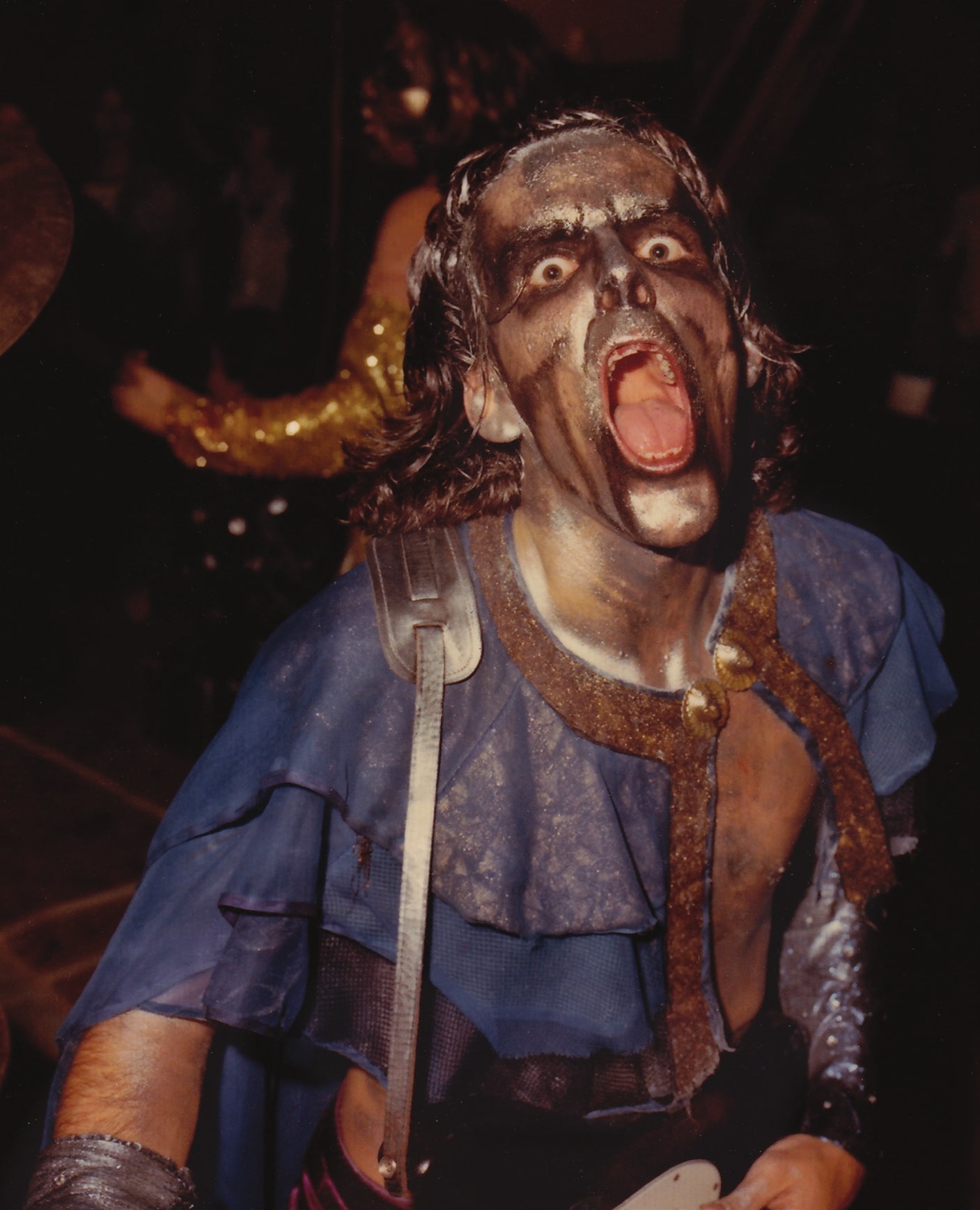
Were all of the songs from ‘Dark Years’ recorded at the same session? Were you planning to release an album but haven’t found a proper label?
The ‘Dark Years’ songs were all recorded in a very cold shed. Over a period of days, on a 2-track cassette.
To be truthful, we thought of it as creating songs for the live show, more than recording or releasing an album, especially given the content of the songs.
What happened after the band stopped? Were you still in touch with other members? Is any member still involved with the music?
We evolved into a recording project and played live a couple of times, but all as “Good Time Punks,” including band reunions. Colin (my brother and bass player for the band) and I reconnected in 2018 to form a classic rock duo called Dutch Courage, Jerry Brown our drummer plays with a bar band called Topaz. Unfortunately, our lead guitarist Garry De Vost passed away a few years back. (RIP).
I wrote and recorded several Christian rock songs in my little studio, and plan to do a solo act soon, of the classic rock songs my brother and I did.
Looking back, what was the highlight of your time in the band? Which songs are you most proud of? Where and when was your most memorable gig?
One of the highlights was playing Oil Can Harry’s in Vancouver on Grey Cup weekend, they could never get the blood off the wall from our show no matter what they tried, but there were many highlights.
Of the “Dark Years” era, probably ‘Vaseline’ was my favourite, which was recorded entirely ad lib.
I am proud of all that we did, including the upcoming album.
Is there any unreleased material by Twitch?
Probably somewhere, but I don’t know.
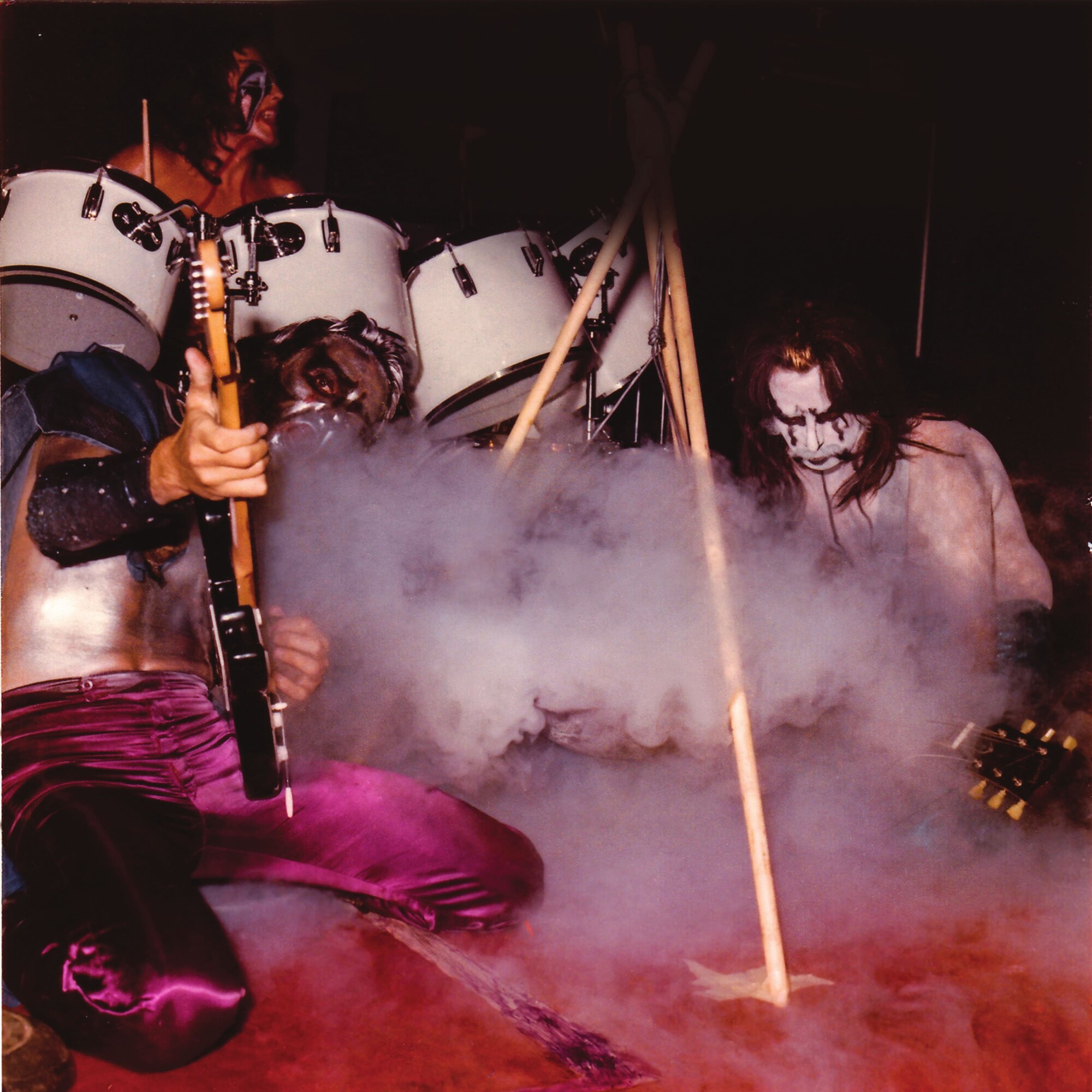
Thank you for taking your time. Last word is yours.
Just wanted to say thank you for this interview Klemen. I really enjoyed it. Meanwhile check out the Dark Years reissue out via Supreme Echo.
Klemen Breznikar
Supreme Echo Facebook / Instagram / Bigcartel / Bandcamp

